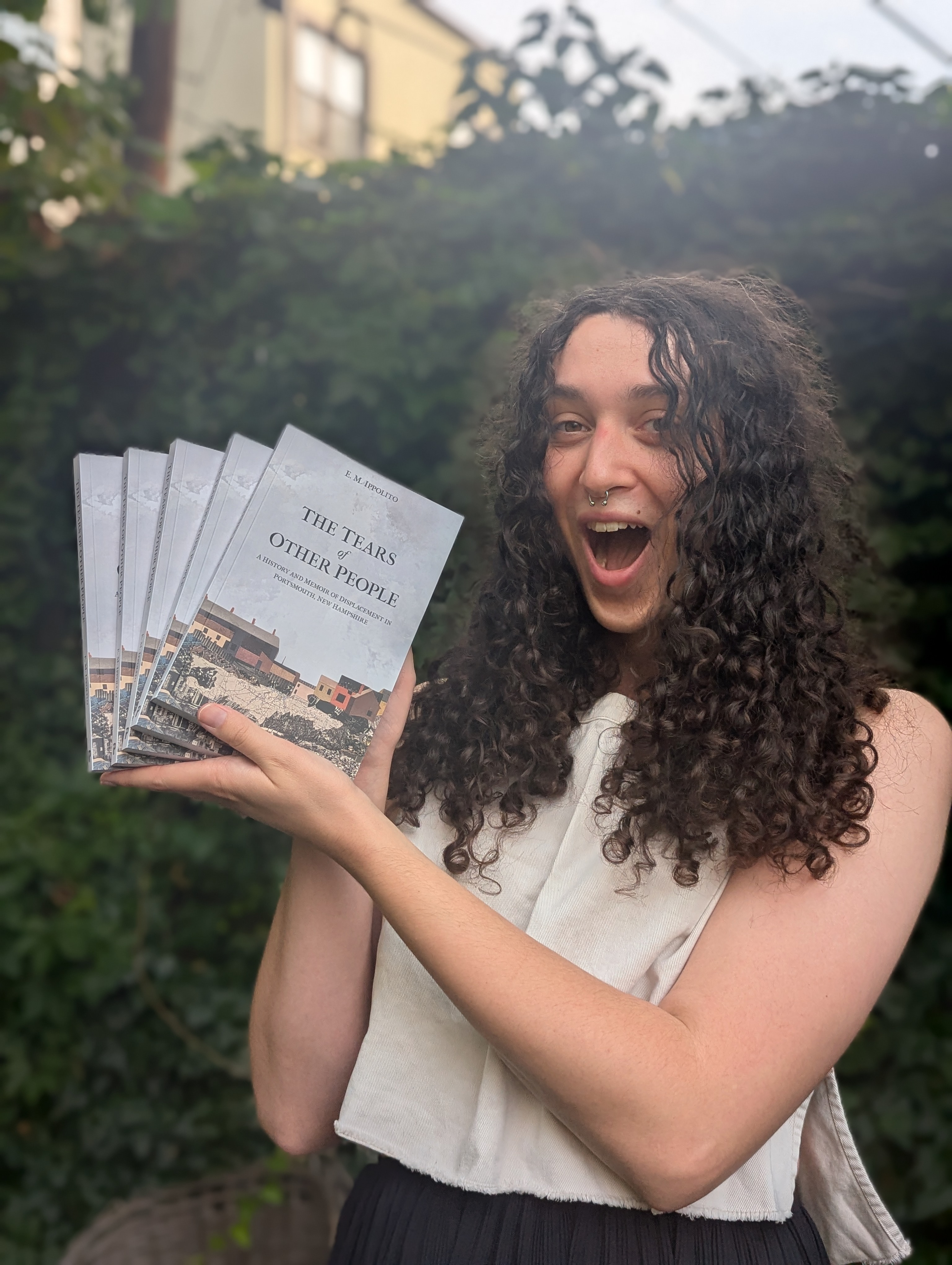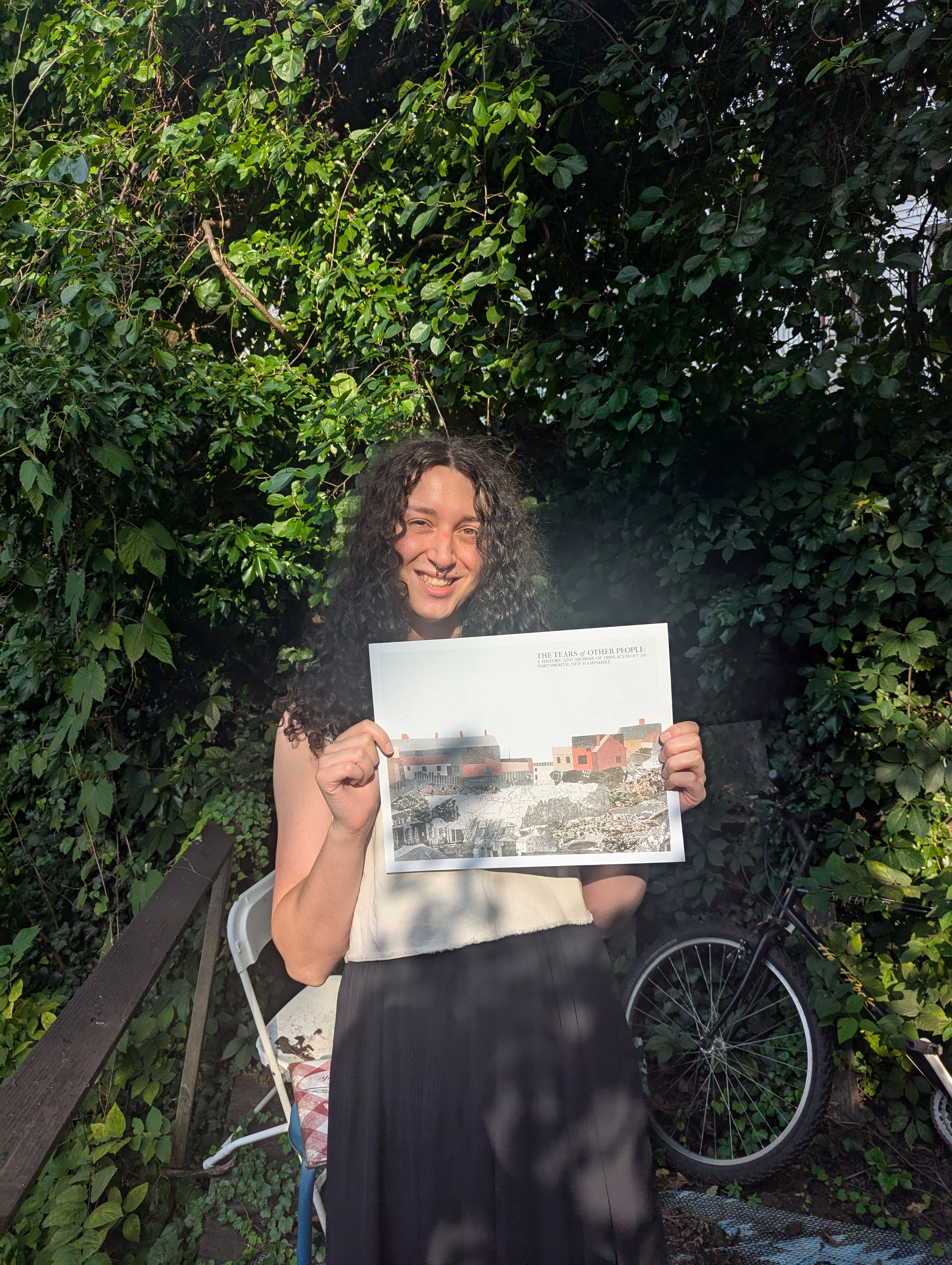The Tears of Other People is out
The Tears of Other People is out
some updates + what this means to me
Anyone who’s had half a conversation with me in the last five years has heard me talk about Portsmouth, New Hampshire and my displacement there, probably whether they like it or not. Sometimes it feels like the defining theme in my writing, the thing that feeds into literally everything else. It’s been this way for years. I’ve been researching and writing the book on displacement in Portsmouth since I was twenty-two years old—earlier than that, even, if you count the local history zines and pamphlets I wrote in 2020 which formed an early foundation for this project. The book that defined most of my adult life is now out in the world and available to read. Thank you so much for your listening and support.

some launch updates
To keep the announcements part of this post brief and upfront:
Launch events are in August! NYC launch is Aug 22 at Hive Mind Bookstore (7-9 then an afterparty, details tba). Portsmouth events start with the Queer Community Book Launch and Mingle with Lezhang Seacoast at Cup of Joe Aug 24, and this one’s for queers specifically. Aug 25 I’m speaking for general public at Portsmouth Historical Society. Aug 27 I’m doing another general public event in the auditorium of my childhood library, which is a dream come true for someone such as myself.
If you’re queer or trans and a historian or memoirist in NYC or New England, hit me up and let’s talk about ways we can plug your work to collaborate in the launch events next month. I would love to use this opportunity to meet and promote other people doing similar work.
Audiobook production is restarting next month after a false start earlier this summer. I’m a little behind on this part but very proud and excited to say that the book WILL have an audio version
IF YOU ORDERED BUT NEVER RECEIVED YOUR COPY, let us know! My publisher’s email is irrelpress@gmail.com
i am very eager to know your reactions
Last night, Friday July 25, I got word that orders have started arriving at houses. My dear friend Vic called me with my book in their hands and we both kind of gasped and screamed over Signal videochat for like fifteen minutes. If you ordered already, keep an eye out for the book in your mailbox as well as the special risograph artprint for folks who donated extra to help with the costs of editing and audio production.
If you haven’t ordered yet, you can get the physical copy here and the ebook here. Email me at eviewrites@duck.com if you want a copy but don’t have the cash and I’ll send you the .pdf for free.
Like any author, I guess, I’m dying to hear people’s reactions to the book. Good or bad. It’s a small project, only 250 copies exist in print. If you’re drawn to engage with it (or with me) I enthusiastically welcome all reviews, social media posts, emails, etc regardless of content or criticism. Seriously — I hope to hear from you! :)
what this means to me
DIY takes a lot of hands. This part is more than just an acknowledgment section, I think it’s the heart of the work.
The project owes a lot to a lot of people, but thanks especially to everyone who purchased the book at preorder, as well as the fabulous cover artist Julia Adler @exstrangers, editor Tal Milovina Mancini, and publisher Holly Meadows-Smith at Irrelevant Press. I can’t express how grateful I am to all of them for their patience, attention, and generosity in helping this project become what it is.
I also want to thank the people who helped with research. I based my analysis on the testimony of people marginalized and displaced from Portsmouth, including myself, and you wouldn’t believe how hard it can be sometimes to get historical records of those people’s testimony. Thank you to all the people who spoke with me directly about their experience in Portsmouth, as well as the librarians who helped me source additional testimony from deceased residents downtown. Thank you to the staff of Strawbery Banke Museum, Portsmouth Athenaeum, and Portsmouth Public Library Special Collections, as well as the librarians of NYPL's MDLHG division on 42nd. Thank you to the community-centered preservation efforts of Sherm Pridham for the people of Puddle Dock, Tekla Haasl for Temple Israel Synagogue on State Street, and Valerie Cunningham for Black Heritage Trail New Hampshire and the Black community downtown Portsmouth. These oral histories are literally priceless and they inspire me to be a better keeper of memory and neighbor in my own historical context.
I want to talk specifically about a college advisor I had, Amy Richter, who is also owed a great deal of thanks. When I started this research I was still an undergrad at Clark University. The college’s institutional review board (IRB) rejected every proposal I sent them regarding oral history field work in Portsmouth on the grounds that the discipline of oral history is a social science operating on “human subjects.” Didn’t matter how many times I explained that my approach was rooted firmly in the humanities, nor how many times I directed them to the Oral History Association’s specific, federally-backed guidelines re: the exceptional position of oral history work in IRB oversight. If, instead of oral history, I were taking an internship at a hedge fund, or writing code for a weapons system, that would be free of ethical liability institutionally speaking. But the university made it very clear: under no circumstances was I to receive funding for talking to my neighbors about their lives. Not unless I made them sign a liability waiver and removed their names from the record.
Amy Richter went to bat for me. And when that didn't work—when the university continued to do what it always does, blocking and formalizing and watering down the production of marginalized knowledge—she encouraged me to go off and do the primary source research myself. She knew I was into DIY shit; as a junior she once asked me the most direct question anyone’s ever asked, being, “You like to dress and talk like a punk but you’re always neurotic as hell and you send me like, ten emails every assignment. What is your deal?” With Amy Richter’s help, I finally did a proposal that the university greenlit. I was able to knock out much of my early research (literature review only—no "human subjects" were harmed, I promise) with a small sum of money from the school. After that money ran out, and then after I graduated, she continued to call me from time to time and check in on the book’s progress. Her support went above and beyond her role as professor. It showed, in my view, a more holistic commitment to the discipline of history than academia typically allows.
It takes a lot of people to DIY a work of history, but at the culmination of this effort I am proud to say: Fuck a university. I made this book through the help and dedication of people around me. Mentors, neighbors, archivists, activists, and fellow historians, as well as a large mob of faggots, friends, and lovers. My alma mater for this work was not Clark University but the public library. I edited the first draft of this book on the subway commute to a soul-sucking waitress job, and I funded its production with (among other things) a punk show my friends and I threw in my backyard.
If we want to force serious revolutionary thought into the historiography of US localities—a historiography of mostly colonialism and white supremacy, of piecemeal dissertations towards the queer or feminist reading of this or that piece of the empire—we have to abandon dreams of adequate funding. I know this is hard. I cried a lot in accepting that the work I must do will not happen on a Masters-PhD track. The work will happen when we (meaning working people, not just students, not just faculty) construct the counternarrative.
The book I wrote is not perfect, and quality notwithstanding I don't suspect it will earn me a teaching post or professorship as long as I live. But it’s sure as hell a counternarrative. By that I mean, in the local context, I am optimistic that it will productively guide the way that some people think and act, rather than impress a few PhDs on a dissertation committee and then sit on a shelf forever. If I’m lucky, this work might play a small part in creating the ideological and intellectual infrastructure of a different world. Sure, this is a big, earnest ambition for a debut book. But no more unrealistic than an adjunct faculty’s hope of retirement, or a Masters student’s dream of a living wage. None of us lives to write forever, especially not trannies, especially not with conditions as they are, so we might as well write with a sense of urgency. If we're not committing to confrontation, what they fuck are we doing?
Amy Richter, one of the earliest and strongest supporters of this book, died earlier this month just before its release. She was a great influence to me. I wrote her name in the acknowledgements page before I received the news. I got the impression our politics were very different, but she showed up for me where it counted. She modeled for me the work of a good and honest historian. Someday, I hope to help people realize their creations the way she helped me realize mine: with discipline and enthusiasm, beyond the boundaries of academia.
I graduated college in the downwardly mobile freefall of early transition, deeply alienated from my institution and a great deal of family and friends. After the ceremony, all I could do was sleep. I told myself I would celebrate when I achieved something meaningful, not just this degree I had come to resent. I think this book is that meaningful thing.
The end product is limited and imperfect. It’s an early-career work, maybe excessively earnest, and I already feel myself growing beyond it stylistically. (I’ve been working on a lot of stuff on the side!)
But I told myself I would put this out, and I did. And I'm proud of it. I hope that it’s useful to you.

Your friend,
evergreen<3